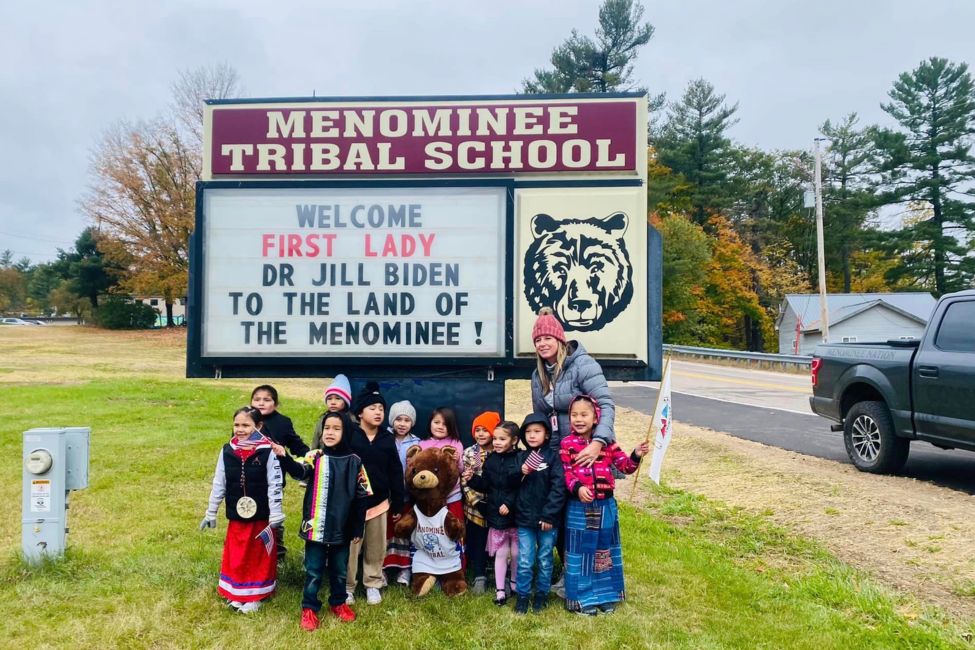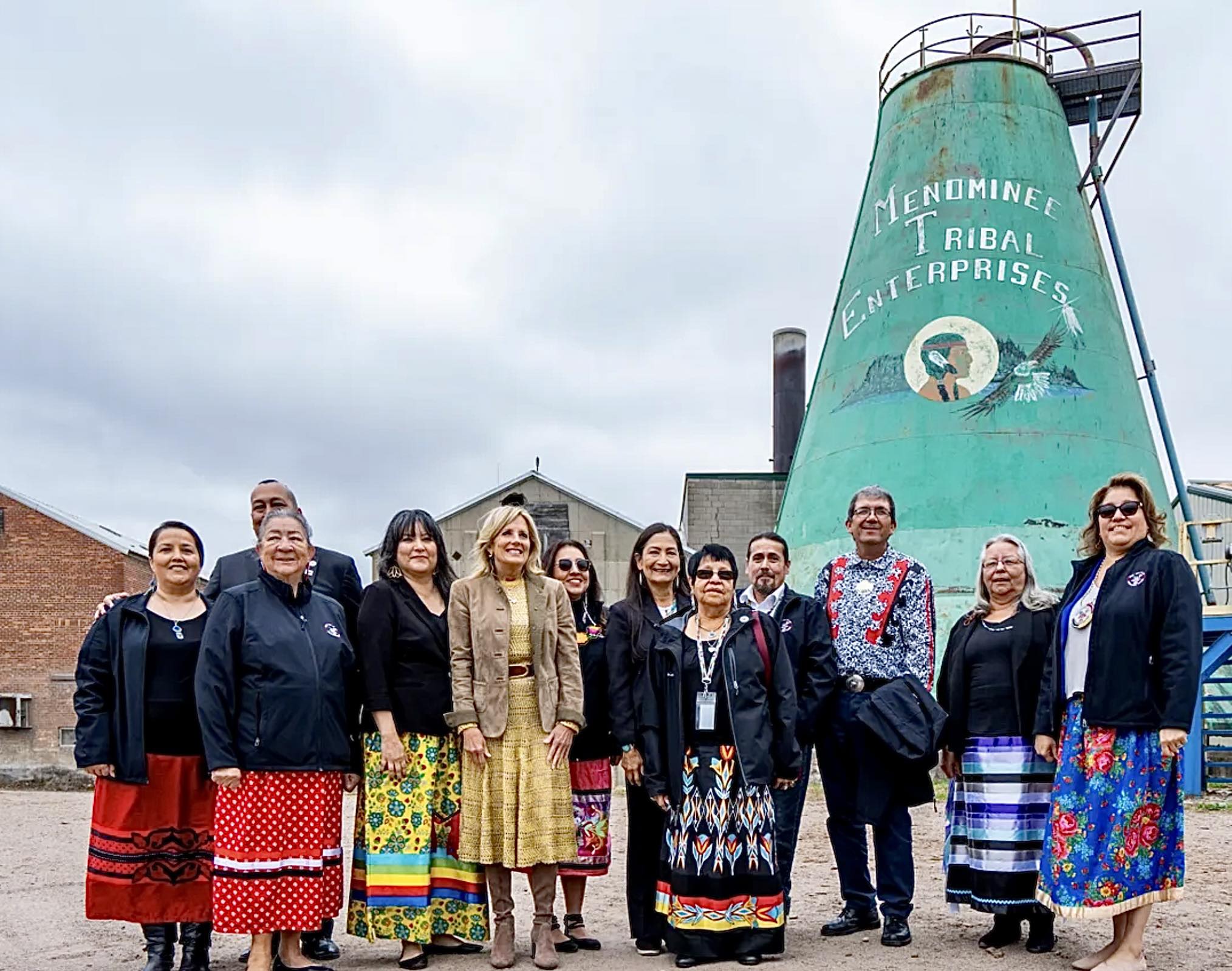
- Details
- By Kaili Berg
First Lady Dr. Jill Biden met with tribal officials from the Menominee Indian Tribe of Wisconsin on Tuesday, October 10, to learn how federal investments are making a difference in tribal community located in central Wisconsin.
She was joined on her visit by United States Secretary of the Interior Deb Haaland (Pueblo of Laguna) and Assistant Secretary of Interior Bryan Newland (Bay Mills Indian Community).
Menomonee Chairwoman Gena Kakkak said in a press release that she was thrilled to learn of the visit.
“We are very honored to have the First Lady visit our homeland and to also welcome Secretary Haaland and Assistant Secretary Bryan Newland is a once-in-a-lifetime event for our Nation,” Kakkak said. “We appreciate the Biden Administration for all their support in our many initiatives and look forward to building strong partnerships with each of them.”

First Lady Dr. Biden and Interior Sec. Deb Haaland meet with Menominee tribal officials (Photo/Menominee Tribe)
In a speech, Jill Biden touted the commitment the President has made to Native American tribes and noted that his administration has made the largest federal investment in Indian Country in U.S history.
“That’s why Joe’s made the largest-ever federal investment in Indian Country,” Biden said on Monday in a speech at the College of Menomonee Nation. “He’s honoring the nation-to-nation relationship – making sure all parts of his administration are consulting with tribes. And he’s begun an unprecedented collaboration with Tribal Nations to manage the lands, waters, and natural wonders that are important to you because you know best what you need.”
As part of the two-day stop, Biden and her staff toured the Menominee Tribal Enterprises facilities to learn more about their world-renowned sustainable forestry practices. The stop at the sawmill came after the Tribe was awarded a $5 million grant last year to construct a new building and replace equipment.
“Today, I saw how the Menominee people and the U.S. Department of Agriculture are working together to bring federal resources here so the tribe can continue sustainably managing the forest using knowledge passed down from generation to generation – harvesting lumber while protecting the environment,” Biden said in her speech.
They also visited the College of Menominee Nation (CMN) and learned about the Tribe’s approach to community education and sustainable development as they toured the Sustainable Development Institute (SDI) Research Garden on the college campus.
“We are excited to host First Lady Jill Biden to the College of Menominee Nation,” CMN President Chris Caldwell said in a statement. “Her visit and recognition of Tribal Colleges and Universities is historic and is an opportunity for us to share our unique vision for building our future generation of leaders and educators.”
On their final stop, Biden and her staff were special guests of honor at the Women’s Empowerment Summit and Training at the Menominee Casino and Resort. The event is CMN’s second-ever Women’s Empowerment Summit, which featured speakers, a panel of indigenous women leaders and breakout sessions with traditional wellness and crafting activities.
“This visit means so much to our community and for the Sustainable Development Institute,” Jennifer Gauthier, CMN SDI Director, said in a statement. “We want to highlight the innovative projects and research taking place at our Institute and on campus with First Lady Biden.”
More Stories Like This
Native News Weekly (August 25, 2024): D.C. BriefsUS Presidents in Their Own Words Concerning American Indians
Coming Up on Native Bidaské: Behind the Animation: Joey Clift Talks “Pow” and Native Storytelling
Two West Virginia Guardsmen Shot Near White House
Next on Native Bidaské: Chef Sean Sherman Talks “Turtle Island” and the Future of Indigenous Food
Help us tell the stories that could save Native languages and food traditions
At a critical moment for Indian Country, Native News Online is embarking on our most ambitious reporting project yet: "Cultivating Culture," a three-year investigation into two forces shaping Native community survival—food sovereignty and language revitalization.
The devastating impact of COVID-19 accelerated the loss of Native elders and with them, irreplaceable cultural knowledge. Yet across tribal communities, innovative leaders are fighting back, reclaiming traditional food systems and breathing new life into Native languages. These aren't just cultural preservation efforts—they're powerful pathways to community health, healing, and resilience.
Our dedicated reporting team will spend three years documenting these stories through on-the-ground reporting in 18 tribal communities, producing over 200 in-depth stories, 18 podcast episodes, and multimedia content that amplifies Indigenous voices. We'll show policymakers, funders, and allies how cultural restoration directly impacts physical and mental wellness while celebrating successful models of sovereignty and self-determination.
This isn't corporate media parachuting into Indian Country for a quick story. This is sustained, relationship-based journalism by Native reporters who understand these communities. It's "Warrior Journalism"—fearless reporting that serves the 5.5 million readers who depend on us for news that mainstream media often ignores.
We need your help right now. While we've secured partial funding, we're still $450,000 short of our three-year budget. Our immediate goal is $25,000 this month to keep this critical work moving forward—funding reporter salaries, travel to remote communities, photography, and the deep reporting these stories deserve.
Every dollar directly supports Indigenous journalists telling Indigenous stories. Whether it's $5 or $50, your contribution ensures these vital narratives of resilience, innovation, and hope don't disappear into silence.
 The stakes couldn't be higher. Native languages are being lost at an alarming rate. Food insecurity plagues many tribal communities. But solutions are emerging, and these stories need to be told.
The stakes couldn't be higher. Native languages are being lost at an alarming rate. Food insecurity plagues many tribal communities. But solutions are emerging, and these stories need to be told.
Support independent Native journalism. Fund the stories that matter.
Levi Rickert (Potawatomi), Editor & Publisher

